
We kindly inform you that, as long as the subject affiliation of our 300.000+ articles is in progress, you might get unsufficient or no results on your third level or second level search. In this case, please broaden your search criteria.


Italy is facing the potential radical transformation of electoral engineering and the party system, which has been tightly connected to the necessity for the political system reform by the governing Democratic party. The Italian society in a crisis has found itself in front of the choice offered by the current Italian Prime Minister Matteo Renzi, in an attempt to shift the executive power from the unstable and disfunctional domain, caused predominantly by the inadequate electoral systems and perfect two-chamber parliament, to the domain of single-party government within the context of asymetrical bicameralism. The paper deals with the recently adopted electoral system which inaugurates one-party majority in the Chamber of Deputies, the lower chamber of Italian Parliament, as well as with the ongoing constitutional reform, which would significantly reduce the power of the Senate, the upper chamber. With the implementation of these institutional reforms, there would be a dramatic change of the constitutional and electoral engineering in the direction of centralising the power of the Italian executive. The very last phase of application of this idea is constitutional referendum, as a necessary confirmation of the already adopted change in the parliament. The main emphasis of the paper is placed on the analysis of the contents and political consequences related to this institutional arrangement. Focusing on the issues of democracy of electoral regulations, centralisation of political power and destruction of the separation of powers principles, the paper concludes that the analysed reforms have authoritarian undertones. In one particular excursus, it is highlighted that these institutional reforms go along with the general political activity of Matteo Renzi, the initiator of the reforms; that is, that they belong to nondemocratic tendencies close to the political discourse and approach known as Berlusconism. Finally, a potential scenarios are offered, which present plausible results in the forthcoming period depending on how successful or unsuccessful the implementation of the institutional arrangement will be.
More...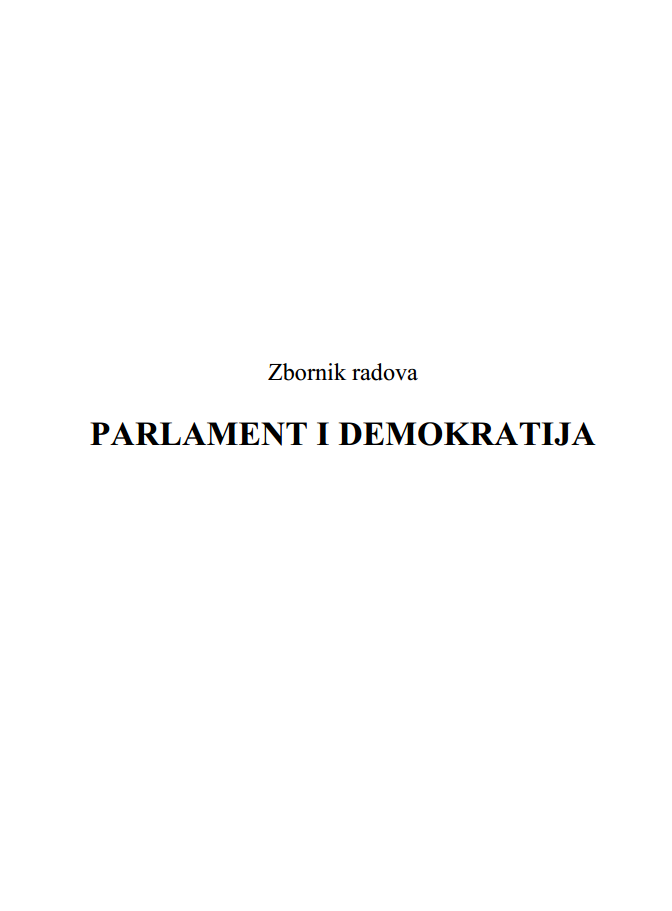

The report examines the institute of "putting under cover" an MI employee in various bodies and organizations – state, municipal, public, NGOs and others. An attempt to describe the legal and functional status of the employee under cover according to the cited Regulation for gaining cooperation and organizing the cover of MI employees in government authorities, organizations and legal entities approved by the Minister of Interior. In the course of legal and operational analysis "rhetorical" questions arise, which need higher government authorities and MI management to give reliable answers in the legal space. The figures of "undercover officer" and "officer of the cover” mentioned in different legal documents and acting in the legal reality are in support of this unclear situation. A need appears to refine the details in legal status and functional purpose of both referred types of operating institute.
More...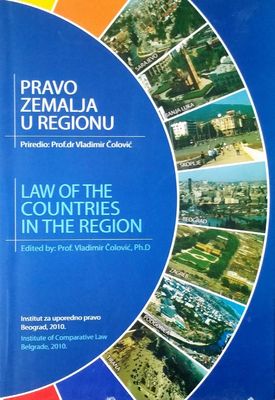
Following the principles of the States of low and the reign of low, as well, a modern and efficient state should especially be based on the strategy of the reform, depolitreization, rationalization, professionalization, the new public menagment, eadministration and on the standards and low of the Euroean Community. Therefore, in the scope of the changes of governing, the reform and the modernization of the State administration, the process of the system streghtening and the capacities of the State administration organs, the special importance and actuality are given to the states of the West Balkans. Because of the special importance of the organizational aspect for the functioning of the administrative system, the basic elements of the State administration (law basis , types and numbers of the State administration organs and their internal organization) have been taken into consideration in the Republic of Serbia and Montenegro, as the former republics, i.e. the state members of the Federal Republic of Yugoslavia and in the state community Serbia and Montenegro.
More...
In each country, based uponon a democratic legitimacy of the authority which "pumps" through free and fair elections, a special structure of bodies competent to conduct the elections is appearing (electoral bodies). They are now often defined as one of the forms of “the authority of fourth power", and their number, structure, nature and competences depend on different national legislations. In Serbia, electoral bodies are numerous and depend on the internal territorial organization of Serbia and on the elections which are called for. In Serbia, but worldwide as well, these bodies are often called "the election administration”. The question that appears is whether this name is justified and whether it can or should be used. If we start from the "functions", i.e. from the work and activities of the state administration bodies according the present legal framework in Serbia, it becomes clearer that the electoral bodies are conducting the executive, professional and often the other activities of the state administration bodies. In this context, from the standpoint of the functional concept of the administration in a theoretical sense, which considers the "administrative bodies" as all entities that perform administrative activities, there is justification for the use of the term "the election administration", although this term, as well as the term public administration, is not positive-legal concepts in the Republic of Serbia.
More...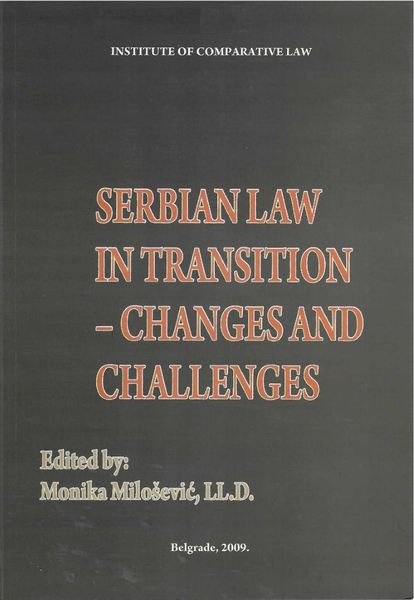
Similar to other countries in the region, Serbia embarked on a process of comprehensive civil service reform over the past couple of years. The motivation for the reform has been the need to strengthen the civil service capacity, lessen political interference and improve the efficiency and effectiveness of civil service functioning. Following the passage of the Government Public Administration Strategy in 2004, two key pieces of legislation: Civil Service Law and Law on Civil Service Salaries were adopted in 2005 and 2006 respectively and their implementation commenced in mid 2006 and early 2007. The objective of the paper is to analyse key elements of new civil service legal framework and point out its main implementation challenges. The paper restricts itself to the following reform elements of civil service system – attempts to depoliticise and professionalise senior civil service cadre, enhance effectiveness and impartiality of recruitment and selection process, and make the civil service a more attractive employer through reform of its remuneration system. The authors argue that although important progress has been made in putting in place the civil service legislation which is in line with European standards, significant efforts need to be invested in order to implement and sustain this ambitious reform programme. The greatest challenges that lie ahead are ensuring the civil service professionalisation and competitiveness and creating an environment of trust, participation, shared values and objectives in which civil servants’ performance and talent will be able to be fully recognized and appreciated.
More...
The paper examines the measures that have been adopted to combat corruption on the road of Serbian transition and EU integration process with a particular emphasis placed on the most recent legislative and institutional developments in the fields of the public procurement, the corporate criminal liability, the Anti-Corruption Agency as well as other issues regulated by the Law on the AntiCorruption Agency. The paper also deals with the key players setting forth relevant anticorruption standards as well as with their respective monitoring mechanisms. The Serbian involvement in these mechanisms is discussed as well. However, the progress Serbia made in the course of the anticorruption reform will be predominantly assessed in the light of the Serbian compliance with the GRECO recommendations, as GRECO has the most developed and effective monitoring mechanism thus far.
More...
The federal bureaucracy comprises the diverse collection of departments, bureaus, services, commissions, boards and other units that carry out national policies (e.g. regulating private conduct, managing federal property, giving or denying persons welfare benefits, licensing, etc). For the sake of the simplicity, we have classified all federal agencies into four broad categories. The most important agencies are departments, and their heads (secretaries) form the President’s Cabinet. At the moment, there are 15 Departments with different roles and functions (e.g. the Department for Homeland Security was formed in 2002 with the main responsibility to organize the defense against terrorism). Departments normally contain a number of agencies within them (e.g. The Federal Bureau of Investigation is placed inside the structure of Department of Justice). The heads of these agencies are appointed by the President, or by the head of the Department. Third category of agencies finds its place outside Departments, but still inside Executive Branch (e.g. the Central Intelligence Agency). The heads of these agencies are also appointed by the President, with the advice and consent of the Senate. All these agencies are considered part of the Executive Branch and are under substantial control of the President. On the other side, Independent Regulatory Agencies (Commissions, Boards) are designed to maintain their independence from the President and executive departments. They are founded to regulate vital areas which are too dynamic, technical or unpopular to be regulated by Congress (e.g. Federal Reserve Board is in charge of U.S. monetary policy). They are run by boards of commissioners, who are appointed by the President, with the advice and consent of the Senate. However, they can not be removed without “cause” (malfeasance), which means that they have substantial level of independence in their work. Sometimes, those agencies are even described as “the headless fourth branch of government”. In addition, there are independent government corporations responsible of delivering the kinds of services usually provided by private corporations (e.g. National Railroad Passenger Corporation – Amtrak). Despite the striking similarities with previous entities, they are not generally considered public agencies. Deregulation process was dominant movement worldwide in the last two decades of the XX century, with the dogmatic belief that the free market and private initiative take necessary corrective measures to solve all problems in modern society. However, corporate failures and scandals at the beginning of the XXI century (e.g. Enron, WorldCom) and especially huge economic crisis in 2008 have been warning signs for more regulatory reforms concerning markets, banks, insurance companies and corporations. Taking that into account, there is no doubt that federal agencies will play even more important role in American society in the years to come.
More...
Kërkesat për sigurinë e IT-së, po rriten në mënyrë të qëndrueshme në shumë fushat e biznesit, ashtu sikundër edhe në manaxhimin publik. Për vitin 2006 dhe 2007,Austria u zgjodh si kampione në e-qeverisje në Evropë. Për të garantuar këtë zhvillim të jashtëzakonshëm, në të ardhmen duhet të arrihet progres i vazhdueshëm në fushën e teknologjisë së informacionit dhe komunikimit, si dhe të sigurisë. Duhet të pritet që transaksionet elektronike të bëhen pjesë integrale e jetës tonë të përditshme dhe shkalla e përdorimit të tyre pa dyshim, do të rritet. Veçanërisht kjo vlen për administratën publike.
More...
Integrimi në BE, pozicionimi në "Hapësirën Administrative Evropiane", rregullimet në ndryshime të mjedisit, ato të orientimit të qytetarëve, janë vetëm disa nga kërkesat me të cilat përballet administrata shtetërore në Serbi. Zbatimi i suksesshëm i reformës në administratën shtetërore, është reflektuar mbi të gjitha në përmirësimin e efikasitetit dhe efektivitetit të punës së saj. Elementi kyç për zbatimin e pergjithshëm të saj kërkon krijimin e një sistemi të zhvillimit profesional, i cili do të sigurojë përmirësimin e vazhdueshëm të njohurive profesionale dhe aftësive të nëpunësit civil. Vetëm në këtë mënyrë, të punësuarit do të jenë në gjendje për të mbajtur ritmin me kërkesat profesionale në rritje në aspektin e njohurive, me kërkesën e aplikimit të teknologjive dhe metodave të reja të punës, me kërkesën për zhvillim të standardeve të reja dhe ofrimin e shërbimeve për qytetarët.
More...
Shumica prej nesh orvaten të - kenë progres të dukshëm, në fushat tona të punës. Megjithatë, rezultatet mund të jenë të ndryshme nga ajo që ne duam të arrijmë. Shqetësimi për trendin udhëheqës brenda dhe jashtë vendit na shpie tek pyetja - pse ne shpesh kemi zhgënjim lidhur me mendimin konvencional për administratën publike? A nuk është e çuditshme që kjo gjë ndodh shpesh e më shpesh, jo vetëm në ”vendet e zhvilluara”, ashtu si ne i quajme ato, por gjithashtu edhe në – “vendet më pak të zhvilluara”, në – “vendet në zhvillim” dhe bile edhe në – “vendet në tranzicion”, vende që janë trajtuar me – “terapinë e shokut”?
More...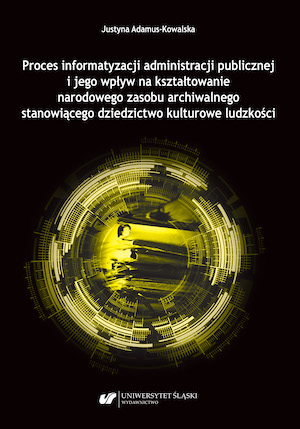
The book discusses changes in the shaping of the national archival resource resulting from the development of information and communication technologies. The supervision and preservation of documentation is of great importance for the preservation and transmission of collective memory from generation to generation. Archives and archivists must not only take into account traditional procedures of conduct, but also must ensure the development of new tools that will allow to maintain a reliable picture of the dynamically changing reality and times in which we live. The process of computerization and introduction of electronic documents to archives is still underway, meanwhile, automatic decision-making tools are being developed, including those that are based on a breakthrough technology, which is the technology of artificial intelligence, hence it is important to discuss the process of computerization of public administration in the context of creating a national archival resource.
More...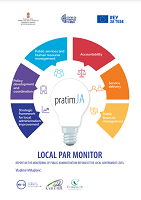
Although the administration reform started almost 20 years ago, it is considered one of the basic reform processes in the country since 2014, both from the aspect of Serbia's accession to the EU, and from the aspect of the quality of life of citizens, the main focus is on state administration and central administration. The assessment of the public administration and the capacity of the administration, which is regularly carried out by SIGMA and which the European Commission uses in its assessments of Serbia's progress to EU, is limited to state administration. The methodology for monitoring public administration carried out by think tank organizations in the countries of the Western Balkans within the framework of WeBER projects also focuses on the work of central institutions. On the other hand, the fact that over 70% of EU legislation is implemented by local self-government units indicates the need to shift the focus, if not completely from the central to the local level, then at least extend it to improving the work and strengthening the capacity of local governments. Through the application of methodological tools, therefore, it is necessary to strengthen the capacity of local civil society organizations to deal with the monitoring of public administration reform at the local level, and to influence the improvement of local regulations, policies, procedures and services through cooperation with local authorities.
More...
This is the Grey Book of Public Services in Serbia, product of the two-year project “Partnership for Public Administration Reform and Public Services in Serbia – PARtnerships“, implemented by the European Movement in Serbia and European Policy Centre from May 2016 till May 2018, on the territory of Serbia, in cooperation with twelve local partners and supported by the US Agency for International Development (USAID). The goal of the project is to contribute to citizen-oriented public administration reform through (1) broader participation of civil society organisations in monitoring the progress of public administration reform, as well as in developing quality proposals for improving evidence-based policies; (2) establishment of two-way communication between citizens and relevant authorities; (3) ensuring reliable information on citizens’ satisfaction with most frequently used and most widespread services from three different areas, as well as on the quality of policy making; (4) providing recommendations for improvement of public services and public administration system. The goal of the Grey Book is to present the most important results of conducted research and to offer a specific set of recommendations for improvement of public service delivery.
More...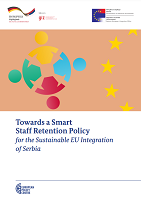
The past few years have witnessed a significant outflow of top-quality civil servants responsible for EU integration-related work, including the management of EU and other development funds (EU/ IPA-related jobs/work). Although the turnover exceeds 30% in some units and departments, there are currently no official measures or a policy to retain civil servants who are essential for the sustainability and success of Serbia’s EU integration process. In the Serbian public administration they are the main source of knowledge of EU policies, its law and funds and are therefore the ones who enable the creation, coordination and implementation of policies consistent with those of the EU.
More...
Open Data progress in Serbia is currently limited both in terms of datasets and the number of government institutions which release their data. Moreover, while there have been research projects which explored the ‘supply side’ of open data in Serbia, the demand for open data has not been assessed in a comprehensive manner. Taking into account this lack of focus on demand for open data, this discussion paper is based on an exploratory research project investigating to what extent think tanks and research-based CSOs in Serbia are involved in demanding open data, and whether they are able to see the value of open data, as well as adequately utilize open datasets. This group of CSOs was chosen as the main research subject given the benefits these research focused CSOs could receive from an enriched data environment in the country. In terms of methodology, being exploratory in nature, this research accordingly relies mostly on qualitative methods, namely desk research, interviews, and stakeholder mapping. However, whenever it was possible, this research includes quantitative analysis of: existing open datasets in Serbia, attendance rates at open data events which are intended to indicate open data demand, as well as methodological trends among CSOs conducting research in Serbia.
More...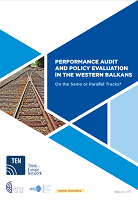
From a conceptual perspective, performance audit and policy evaluation are very close fields, with highly converging goals, methods and tools. At the same time, in the Western Balkans these two fields have been evolving without connection and reference to each other. How can the two processes be brought closer together in the three studied WB countries – Macedonia, Montenegro and Serbia – with a view to ensure efficiencies and synergic development of these rather novel performance management instruments?
More...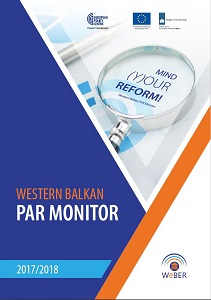
For over 15 years, the Western Balkan (WB) countries have undergone democratisation and transition processes, embarking on deep structural, economic and social reforms to modernise their societies and improve the lives of their citizens. The reform processes are reinvigorated by the aspiration of these countries to become members of the European Union, and they are framed to a large extent by the EU integration process. Good governance lies at the heart of the European integration project, while a public administration that supports good governance needs to be professional, reliable and predictable, open and transparent, efficient and effective, and accountable to its citizens. Accordingly, reform of public administration has been acknowledged as one of the fundamental areas of reform on any country’s path to EU membership. WB countries have been implementing administrative reforms for over a decade now, but since 2014 the EU offers a set of principles for the accession countries to follow and comply with in this area in order to become successful EU member states.
More...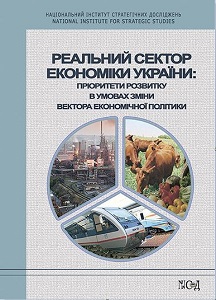
In the report based on the analysis of the dynamics of indicators of the functioning of the real sector of the economy of Ukraine in 2016-2017, the priorities of its development in the conditions of a change in the vector of economic policy are substantiated. The exhausting confrontation of Ukraine in the hybrid war by the Russian Federation is indicated by losses in the sectors of the real sector of the economy. An assessment of such losses has been made; a list of economic sanctions and restrictive measures by Ukraine as a reaction to Russia's aggressive behavior is given. The directions of Ukraine's cooperation with the EU in the real sector are proposed, which is determined by expanding access to capacious European sales markets, using Ukraine's opportunities to attract foreign investments and technology transfer, as well as participation in various EU development programs. The priorities of the economic policy regarding the development of the real sector of the economy are outlined, the measures of macroeconomic and foreign trade policy, economic diplomacy and international trade law aimed at leveling the destructive consequences of the hybrid war and restoring economic growth in Ukraine are defined. For scientists, specialists in public administration and a wide range of readers who are interested in the problems of the development of the real sector of the economy of Ukraine.
More...